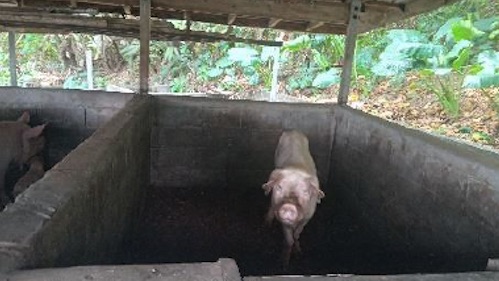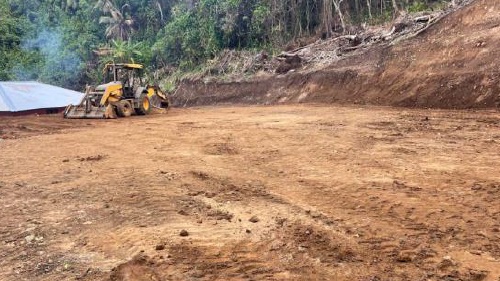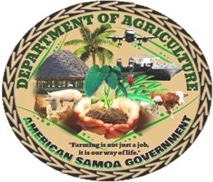- United States Department of Agriculture (USDA) Specialty Crop Block Grant
- Hydroponics I Federal Project - AS 2020 Specialty Crop Block Grant
- Hydroponics II Federal Project - American Samoa Dept. of Agriculture 2022 SCBGP – Farm Bill Application
- Land Cultivation/Preparation Project - Phase I: Land Preparation Techniques – Increasing specialty crop production by improved land cultivation practices
- Hoop House Project - Phase II: Specialty Crop Diversification – Increasing specialty crop production through improved diversification
- United States Department of Agriculture (USDA) Micro Grants for Food Security
- Livestock Farming I – Pig Farm
- Livestock Farming II – Pig Farm
- Livestock Farming – Poultry Farm
- Office of Insular Affairs
- Soil and Residual Testing Federal Project

DOA indicated the need within the territory of possessing the necessary farming equipment and tools to sustain crop farming within the agricultural community. Farming plays a crucial role in ensuring food security and promoting local agriculture, making these tools indispensable for farmers.

DOA successfully conducted workshops for the Micro-Grant Project, issuing 45 applications and receiving all 45 applications for site visits, approval, and funding. These workshops emphasized the importance of adhering to project guidelines, sustainability, and maximizing the benefits of the grant funding.
In collaboration with the Department of Health, the ASG Environmental Protection Agency, and the ASG Department of Commerce, 11 applicants were approved by the ASG EPA and ASG DOH to apply for permits to establish or expand their piggery projects. The collaboration highlighted the commitment of various agencies to support community-led agricultural development. Of the 11 approved applicants, 6 received permits specifically for this grant project.
DOA successfully requested advanced funds from the Federal Grantor to initiate the first batch of Phase 1, which involved constructing the approved standard 8x16 structures and purchasing four piglets per recipient. A first disbursement of $2,800.00 was allocated to complete Phase 1. DOA conducted site visits to assess project progress, ensuring readiness to proceed to Phases 2 and 3. The second disbursement, totaling $1,901.00, covered maintenance tools and pig feed, with remaining funds allocated for the final combined disbursement.
Each sub-awardee/sub-recipient was approved for a total funding amount of $4,701.00. This was facilitated through the successful advance payment request from the Federal Grantor, securing a total grant of $51,395.00.
To demonstrate the Micro-Grant Piggery Project, a total of $16,800.00 was disbursed. Subawards were issued on February 15, 2024, in the amount of $2,800.00 for Phase 1 of the micro-project. Final payments for the piggery projects were distributed on June 5, 2024, to the participants, marking the completion of all project phases.
The total combined distribution to pig farmers under this initiative was $28,206.00. The success of this project underscores DOA’s dedication to enhancing local agricultural practices and fostering self-reliance among farmers.

The American Samoa Department of Agriculture (DOA) has spearheaded a significant initiative with its Hoop House Project, aimed at supporting local farmers in diversifying their crop production. This project emphasizes the cultivation of non-traditional specialty crops using robust and effective hoop houses or greenhouses. These non-permanent structures enable farmers to extend their growing seasons, improve crop yields, and protect their plants from adverse weather conditions, contributing to sustainable agricultural practices in the region.
DOA has provided technical support and resources to farmers to ensure the success of this initiative. Through a series of workshops and training sessions, the department educated participants on the best practices for setting up and maintaining hoop houses. These sessions also highlighted innovative agricultural techniques to optimize crop production in a controlled environment.
To date, 25 hoop houses have been successfully distributed and installed across Tutuila, equipping local farmers with the necessary tools to enhance their productivity. This initiative demonstrates DOA’s commitment to empowering the agricultural community and promoting food security within the territory.
The grant project is scheduled to conclude on September 29, 2024. As part of its successful implementation, the DOA requested and secured a reimbursement of $228,212.11 from Federal Grantors. This amount, received by the ASG Treasury Department, underscores the project’s compliance and effective management of allocated funds.
The Hoop House Project is a testament to the DOA’s ongoing efforts to modernize agriculture in American Samoa and support the local farming community in adopting innovative and sustainable practices.

Increasing specialty crop production by improved land cultivation practices.
DOA is administering this project under the Specialty Crop Block Grant Program to assist farmers with land cultivation and preparation techniques for crop farming. The American Samoa Department of Agriculture (ASDOA) has simplified the process for farmers to acquire an invoice from local vendors equipped with the necessary machinery and tools to conduct land cultivation practices for their crop farms.
ASDOA processes requests by submitting all necessary documentation to the USDA-Agricultural Marketing Services Specialty Crops Federal Grantors for their review and approval of payment for services rendered. The payment amount is determined based on a thorough review conducted by the Federal Grantors. This ensures accountability and proper allocation of resources.
To date, there have been multiple requests submitted for the Federal Grantors’ approval of payments for farmers who requested services through this ASDOA program. Payments are made directly to the local vendors rather than the farmers, ensuring transparency and efficient fund disbursement. ASDOA has been instrumental in guiding farmers through the process, providing technical assistance, and ensuring compliance with program requirements.
Farmers are directed to follow proper channels, which include acquiring vendor invoices, submitting detailed documentation, and providing before-and-after pictures of the land needing preparation or cultivation. This program has significantly contributed to improving land productivity and supporting the farming community in American Samoa.
